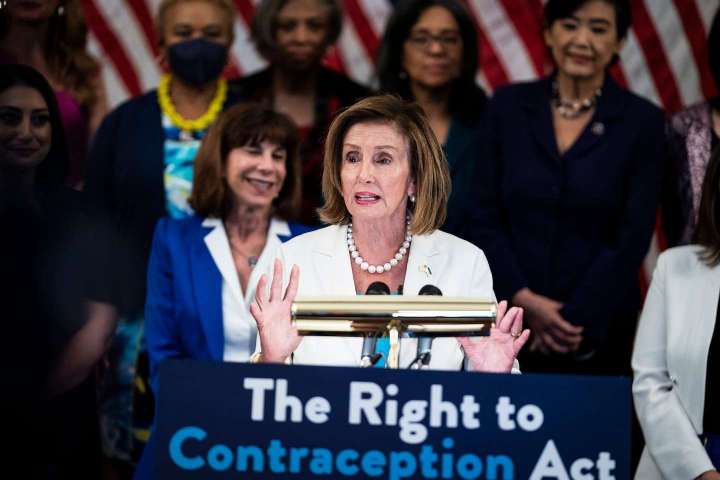Congressional Democrats have spent the past week trying to flip the political script on social issues in the aftermath of Roe v. Wade being overturned. While they historically trod gently around same-sex marriage and abortion rights — and Republicans used such issues to appeal to “values voters” — House Democrats have now forced several votes daring Republicans to vote against what have become popular positions.
Dems seek to drive a post-Roe wedge on social issues — and GOP obliges

Whether the votes will affect Democrats’ political prospects, Republicans largely gave them what they wanted. They voted overwhelmingly against legislation that would federally enshrine a right to contraception and abortion access. And while 47 Republicans voted for a federal law codifying same-sex marriage — spurring hope that the measure could also pass in the Senate and become law — more than three-fourths of the GOP voted against it.
In fact, more than 72 percent of Republicans — 153 out of 211 of them — voted no on all four. And nearly 78 percent didn’t cast one yes vote. (Some missed votes or voted “present.”)
Just 8 out of 211 House Republicans voted for more than one of the bills. Each of the eight voted for both the same-sex marriage bill and the contraception bill.
And three of them added a third yes vote on allowing people to cross state lines to obtain abortions. The three Republicans were retiring Reps. Fred Upton (R-Mich.) and Adam Kinzinger (R-Ill.), along with moderate Rep. Brian Fitzpatrick (R-Pa.), who is seeking reelection.
That vote in particular is illustrative.
Abortion is a divisive issue that is difficult to poll. One recent poll showed 60 percent of people support Congress passing a bill enshrining abortion rights into federal law after the fall of Roe. But when asked a different way — about passing a federal law vs. leaving it up to the states — the response is more evenly divided. Predictably, no Republicans voted for the bill to codify Roe.
But crossing state lines is quite a different issue, according to recent polls. One showed 77 percent of Americans and even 64 percent of Republicans oppose laws that would ban residents traveling to another state for an abortion — a measure which some red states are considering. Another showed even more resistance to such laws: 78 percent overall, and 73 percent among Republicans.
That doesn’t mean such overwhelming majorities necessarily support Congress prohibiting states from restricting such travel. Still, it is striking that only three Republicans voted to prevent such laws.
The contraception bill is probably the vote you’re most likely to see in campaign ads this fall, given that access is an overwhelming consensus issue.
Republicans objected to the vote by arguing that the law was unnecessary; just because the court overturned Roe doesn’t mean Griswold v. Connecticut — the 1965 Supreme Court decision guaranteeing access to contraception — is endangered, they said. But many Republicans similarly expressed doubt that Roe was truly in danger before it was overturned.
Others said they opposed the bill because it didn’t carve out emergency contraception like Plan B, which many conservatives object to on the grounds that it’s tantamount to abortion. (Some Republicans suggested the parties could negotiate on a more bipartisan bill that excluded Plan B, which Democrats rejected.) But even accounting for the nuances of the Plan B issue — and even if Republicans can explain them to voters — the votes are dicey. A recent poll showed 70 percent of Americans and 62 percent of Republicans also support emergency contraception being legal.
Much like these latter two issues, polls suggest that same-sex marriage is something close to a 70 percent issue — 71 percent in the most recent Gallup poll. Unlike the others, though, 47 Republicans decided that same-sex marriage was a yes vote worth taking — probably in large part because it doesn’t touch on issues of reproductive rights.
Those 47 Republicans also crossed over despite many in their party casting the vote as yet another unnecessary show vote on a bill that isn’t going to matter because the Supreme Court isn’t going to overturn existing precedent — much like contraception access.
The diverging approaches on same-sex marriage and contraception, though, reinforce that Democrats were able to turn these into wedge issues that forced some tough votes. Republicans overwhelmingly stood by their base and cast votes that will be easy for Democrats to promote as being against the wishes of a strong majority of Americans.
Whether that ultimately matters next to issues such as inflation is another matter. But we’re in a different world on social issues like these than we were 20 years ago — or even just a month ago.
Philip Bump contributed to this report.






